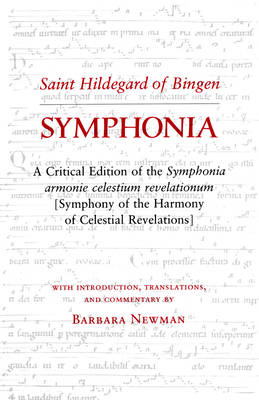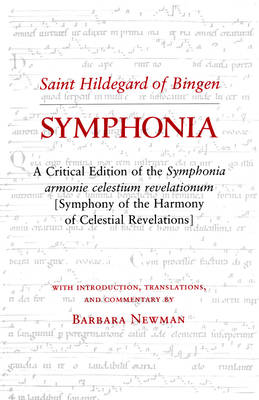
- Afhalen na 1 uur in een winkel met voorraad
- Gratis thuislevering in België vanaf € 30
- Ruim aanbod met 7 miljoen producten
- Afhalen na 1 uur in een winkel met voorraad
- Gratis thuislevering in België vanaf € 30
- Ruim aanbod met 7 miljoen producten
Symphonia
A Critical Edition of the Symphonia Armonie Celestium Revelationum (Symphony of the Harmony of Celestial Revelations)
HildegardOmschrijving
Famous throughout Europe during her lifetime, Hildegard of Bingen (1098-1179) was a remarkably gifted woman by any standards: a composer and poet, she was also a writer on scientific, medical and theological subjects, an abbess, a visionary prophet, and a saint of the Roman Catholic church. One of the relatively few female writers and even fewer female composers of the Middle Ages whose work has survived to the present, Hildegard was neglected for centuries after her death. Recently, however, her liturgical song cycle Symphonia armonie celestium revelationum (Symphony of the Harmony of Celestial Revelations) has been rediscovered, and pieces from it have been performed by several early music groups.
Barbara Newman here provides both literal prose translations and sensitive verse translations of the songs in the cycle, along with a new edition of the original Latin texts, Newman's introduction and commentary provide information on Hildegard's life and on such subjects as the dating of the Symphonia, the theology of music and its use in the monastic liturgy of the twelfth century, medieval musical performance, and poetic styles of the period. Of special interest is an essay by Marianne Richert Pfau which delineates the connection between music and text in the Symphonia.
This edition of the Symphonia will make Hildegard's work readily accessible to all readers interested in medieval poetry, early music, and the lives of medieval women, as well as to scholars concerned with poetry, musicology, religion, and women's history.
Specificaties
Betrokkenen
- Auteur(s):
- Vertaler(s):
- Uitgeverij:
Inhoud
- Aantal bladzijden:
- 348
- Taal:
- Engels
- Reeks:
Eigenschappen
- Productcode (EAN):
- 9780801420092
- Verschijningsdatum:
- 15/01/1989
- Uitvoering:
- Hardcover
- Formaat:
- Genaaid
- Afmetingen:
- 140 mm x 216 mm
- Gewicht:
- 585 g

Alleen bij Standaard Boekhandel
Beoordelingen
We publiceren alleen reviews die voldoen aan de voorwaarden voor reviews. Bekijk onze voorwaarden voor reviews.











